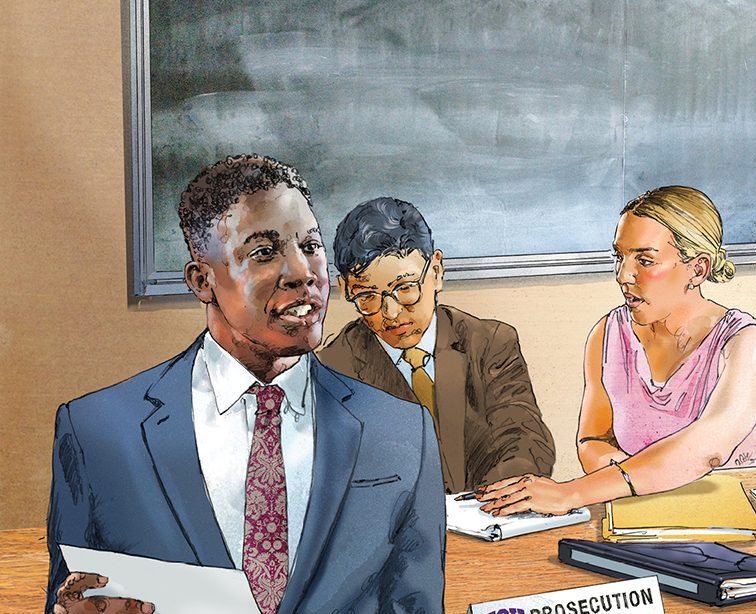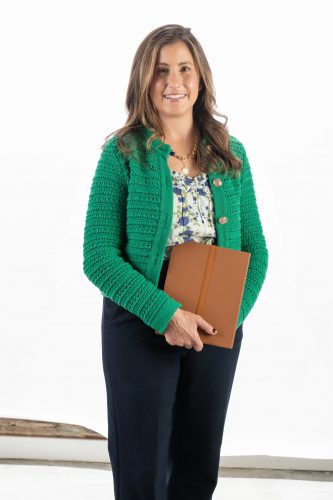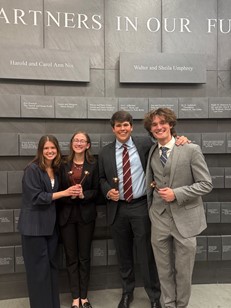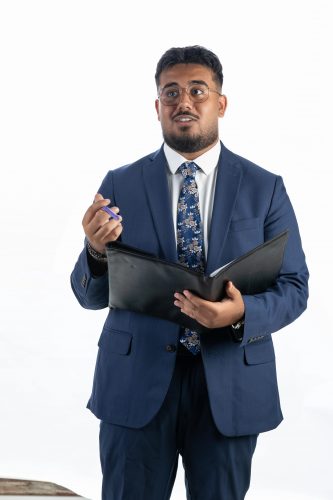Making Their Case
From confidence to courtroom skills, TCU Mock Trial is shaping futures one case at a time.

The verdict is in: TCU Mock Trial becomes a national contender in a few short years. Illustration by Dahl Taylor
Making Their Case
From confidence to courtroom skills, TCU Mock Trial is shaping futures one case at a time.
Passengers on the Mid-Riverina Express train woke to shouts for help, began Elizabeth Meyer, a TCU student acting as the plaintiff’s attorney.
“They would find that fellow passenger Avery Bancroft was dying on the floor of his cabin,” Meyer told the court. “They were shocked, they were horrified, they were panicked. All except for one: the defendant, Taylor Hopson — Avery Bancroft’s own daughter.”
Meyer, a senior political science major from Shorewood, Minnesota, argued that Hopson killed her father during a family vacation, rendering her ineligible to receive millions in inheritance.

Michele Meitl, associate professor of criminology & criminal justice. Photo by Glen E. Ellman
Meyer was clear and confident in the role. But this wasn’t a real courtroom — and she wasn’t a real lawyer. She, along with the other attorneys and witnesses in the room, had not passed the bar exam or even attended law school.
Instead, students from TCU were competing against the University of Oklahoma in one of four trials the Horned Frogs would argue in the American Mock Trial Association’s Opening Round Championship Series.
Each year, university mock trial groups prepare to present both sides of a fictional court case, then face off against opposing schools in a staged courtroom.
Last season, Meyer and the other members of TCU Mock Trial’s A team bested several national contenders when it advanced from regionals to the national competition for the first time.
The feat was even more impressive considering the program’s youth: It was founded in 2021. Students who have participated report that they’ve walked away with connections, friendships and skills — and for some, an early start to a career in law.
Building the Program
TCU Mock Trial founder Walter Flanagin ’24 said competing for his high school’s team shaped his career goals. When he arrived at TCU, where he majored in history, he planned to join the university team — only to learn no such program existed.
Flanagin resolved to start a group. He asked Michele Meitl, an associate professor of criminology & criminal justice, to advise the team and began recruiting fellow students.
Most members lacked mock trial experience, so Flanagin taught his teammates the basics, including the rules of evidence, courtroom procedure and how to write an opening statement.
“It’s hard to build a winning program,” he said, “but I wanted to build [a] program that keeps giving opportunities to future students.”
Training for the Future
“YOU GET A BUNCH OF EXPERIENCE [WITH] PUBLIC SPEAKING, ORGANIZING, WORKING WITH TEAMS, LEADING AND EVERY SINGLE POSSIBLE SKILL THAT YOU CAN THINK OF THAT WOULD BE GOOD IN LIFE.”
Cole O’Brien
Charlotte Gegare, a sophomore strategic communication major, said that becoming a lawyer is more than choosing a profession — it’s personal.
“My biological mother was not the best role model in my life, and she wasn’t the best person to me and my two younger brothers when we were growing up,” Gegare said. “I felt that more could have been done to protect me.”
As a lawyer, she said, she hopes to advocate for people in need. “I know that there are children currently that are struggling with way worse than I ever went through. And if I can be a part of their journey and be the person sitting in their corner and standing on their side … in whatever way I can do that, I want to.”
For many students, the learning is already translating into results. “One of the judges, who’s a current law student, quipped that we understand the rules of evidence better than they do,” said Michael Shehata, a junior political science and psychology major from Keller, Texas.
Flanagin, now a second-year law student at Georgetown University, said the skills he learned in mock trial translated well to law school.
“We’ve been talking about the same sort of burdens of proof and stuff that you would learn on the mock trial team,” he said. “A lot of the background knowledge, just knowing how court systems work, helps you understand the cases you’ll read, especially first semester in law school.”
In the trial against OU, Cole O’Brien, a senior criminal justice major from Fort Worth, took the role of a plaintiff’s attorney in Shahid v. Hopson. His faux client, Shannon Shahid, Bancroft’s other daughter and Hopson’s half-sibling, alleged Hopson killed Bancroft and therefore could not inherit his estate.
Shehata played a photojournalist and witness. From the stand, he recounted the scene of the crime to O’Brien.
“I saw Mr. Avery Bancroft unconscious on the floor … so I grabbed my camera. And while I was doing that, I heard someone crying over my left shoulder.”
“Do you know who that person was?”
“Yeah, it was Taylor Hopson.”
“What did you do?”
“I panned my camera over, and I wanted to capture that moment as well, but as soon as Taylor Hopson saw my camera, they stopped crying — almost like they never really were.”
Winning as a Team
Most TCU Mock Trial team members are interested in law careers, Meitl said, but students from all majors can and do join.
Members come from degree programs including English, political science, anthropology and business.

Team members were honored at the 2025 American Mock Trial Association’s Opening Round Championship Series. Courtesy of TCU Mock Trial
“I think the interdisciplinary part of mock trial is fantastic,” Meitl said. “They have different interests, which can, I think, be good for students who sometimes get a bit siloed in their own major.”
Gegare, from Menomonee Falls, Wisconsin, said her strategic communication studies and mock trial experience feed off each other.
“Being able to analyze material and break it down professionally and clearly, and then be able to present that material persuasively — I believe that these are key skills in law, but also that tie into my major,” she said, “and I have gained a lot of confidence within both of those areas.”
Meitl said the program provides transferable skills, including the ability to adapt, think critically and learn from failure.
“You get a bunch of experience [with] public speaking, organizing, working with teams, leading and every single possible skill that you can think of that would be good in life,” O’Brien said.
Meitl said the students’ closing arguments consistently impress her. “You have to adapt to what’s going on in the trial,” she said. “Students don’t usually have that written out and memorized. They have to think on their feet.”
The students’ growth comes from preparation, she said, but also from learning to work as a team.
In O’Brien’s first year on the team, he served as captain during a competition in Waco, Texas. At first, “there was a moment of disjunct whenever all of us weren’t exactly comfortable,” he said. “There were some people that were so new at communicating everything.”
The team took a brief break between rounds.
“We all had a moment of, ‘Let’s talk about what’s going on. Let’s get in the right mindset,’ ” O’Brien said. “After we had our little conversation, we really jelled together in a way that I wasn’t expecting.”

Michael Shehata, political science and psychology major. Photo by Glen E. Ellman
The team bounced back and performed well in the second half of the trial.
Meitl earned the 2025 Deans’ Award for Teaching for her work advising the program. “It’s a tremendous amount of time and work,” she said, “but I do it because of the impact I see on these students.”
Eventually, TCU aims to make the national championship, Meitl said. “The sky’s the limit for this group.”
In the mock courtroom, the students also bring boundless creativity.
In closing remarks in the Hopson case, O’Brien reminded jurors of three key facts: Bancroft had too much potassium in his system. Hopson had access to potassium. And Bancroft had planned to change his will.
“We hold the burden to prove to you by preponderance of the evidence, just meaning more likely than not — a grain of sand on one side of the scale just makes it slightly more heavy — that Miss Hopson was a culpable actor.”
Unlike in real courtrooms, mock trial doesn’t end with a dramatic verdict. Instead of issuing legal rulings, competition judges tally scores for the mock lawyers. Thus, Hopson’s inheritance dissolved into the fiction it was, but the Mock Frogs walked away with something more valuable: poise, perspective and the experience of succeeding — in court and in life.

Your comments are welcome
1 Comment
Congratulations to the entire team including their advisor and Dean’s Award for Teaching.
This is an awesome opportunity for the Mock Trial Team.
Go FROGS
Related reading:
Alumni
David Lay Williams Discovered His True Passion for Political Thought at TCU
The political science professor explores economic inequality’s history and moral impact in “The Greatest of All Plagues.”
Features
Government of the People
Democracy demands the participation of its citizens.
Research + Discovery
Sam Arnold Challenges Students to See Politics from Different Vantage Points
In a Q&A, the political scientist talks about leading his class in discussions on justice and social cooperation.